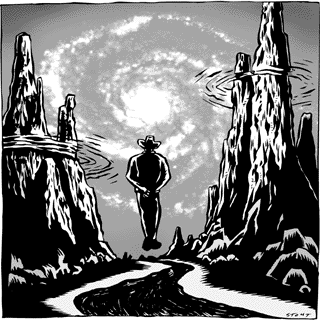Little Fleshlets, On the Run
By Michael Ventura, Fri., July 23, 1999
|
|
In my back-pocket black notebook I wrote the date numerically without punctuation: 111999
The first day of the last year of the last century of this millennium.
Then I wrote the place and time: Terlingua -- Texas -- 2AM.
Terlingua's a stone's throw from the Mexican border, near the Rio Grande. It calls itself a ghost town, but take that as a metaphor: It's a place of spirits, alright, and it's true that the people there have left the so-called "normal" life behind, and there are ruins of old adobes and abandoned mines -- the remains of toil and dreams; but in Terlingua flesh and blood dances and sings, and paints, writes, prays, imbibes, and looks for hours at the desert vastness all around -- a jagged, dangerous labyrinth of mountains, canyons, arroyos, and mesas, cut through by the great river.
In the wee hours of New Year's Day, 1999, the moon was full. I know no whiteness like the harsh yet soft gleam of moonglow on that land -- a strong enough light to read by, it cast delicately etched black shadows from every rock and shrub. The outline of my Panama hat and leather jacket made my shadow seem bigger and more powerful than I (as one's shadow-side so often is). The only sounds were the rustle of the breeze in the shrubbery and the murmur of my friends talking not far from where I stood. And I thought:
The voices of friends and the song of the wind, surely that is more than enough to evoke and confirm one's faith -- that, and a pulsation in the air which might be the heartbeat of God, with the clouds a strangely quilted pattern above, such as I'd never seen, translucent under the moon. I offered a prayer: "Thank you, dear God, that I am included in the spectacle of Your Creation."
It felt like a night of passage, a night when the whole world moved one step closer to the end, not of civilization, but of the power of this civilization to imagine its future -- the end, then, of imagination as we've known it. For when you get requests from several magazines to submit your prediction for "life after 2000," then you know that we as a culture and as individuals are grasping at straws, trying frantically to imagine the unimaginable, to manufacture visions, to exert just a little control over the future by anticipating and predicting it. My friend Spider had been speaking that day of "the mind, that nattering entity," and how the mind "hankers after some kind of understanding -- 'cause it's the gatekeeper." It seemed that, like myself, everyone dear to me was trying to walk through the gate of their own minds and expectations into something we can't quantify or qualify; for we will be the future as we are present and the past, and if there is to be true newness in that future it must be within us. So I replied to only one of those editor's queries: "No matter what we think or imagine or predict, something unexpected will change everything -- it always does."
One unexpected thing, on this particular journey, was how difficult it was for me to speak -- though the difficulty didn't stop me from trying (which may have been a mistake). My words either weren't getting out at all or were garbled in transmission. My heart felt like a darkened room in which you know there's furniture but you don't know where it is and you're afraid of tripping over it. I was remembering a time long ago when I'd read a poem by George Seferis to a then-14-year-old student named Stenya, and had asked, "What do you think makes a person write a poem like that?" Stenya replied: "Long long periods of indecision and suffering, when you don't know which life is your own." At times like this I've always remembered that sentence. Standing there under the moon, after writing the date -- 111999 -- I felt the urgency to write something that would be, for me, absolutely real. Something that would be a letter to my loves, living and dead, with our relationships changeless and changing. For my faith in writing is just this, and it applies even more to the writer than to the reader: An honest sentence should look you straight in the eyes and leave you nowhere to hide. Only when we have nowhere left to hide are we true.
Slowly three sentences formed within me, and I inscribed them with this punctuation:
The paradoxes are singing --
The truth doesn't take sides --
What is as ruthless as love?
After sunup, Spider led me up a steep slope that he called "Fossil Hill." Everywhere were rocks of every size in which were etched the outlines of ferns, sea shells, tiny fish -- for at one time this desert, these mountains, this mesa, had been the bottom of a sea. How many upheavals, how many apocalypses, had been necessary to change that ocean floor into this mountainous desert?
What is as ruthless as love?
Time.
Time is that by which oceans become deserts, which will, one day, again become oceans. And I remembered that the top of Mount Everest, earth's highest point at 29,141 feet, is made of marine limestone. The rock of Everest's peak was molded in the depths of the sea, and through a remorseless inexorable movement of Time that undersea rock made its way high into the air to become a mountaintop. And it hasn't stopped moving. Will it continue up or head back down? Will this happen in moments of cataclysm or in an endless series of earthquakes or both? I remembered that people behave that way too.
And I remembered a fragment of correspondence from my friend Jill. I'd written her last fall about sitting by the banks of the Chattahoochee River in Atlanta when a simple and inescapable sentence said itself to me as though it were the river speaking: Life makes no deals. She'd written: "About 'life makes no deals' -- you really see it when you're in nature. Supreme beauty built out of a remorselessness we'd better not forget. It's the remorselessness that builds the beauty."
What will "life after 2000" be, and what will happen to each of us? Make lists of predictions, compare your lists, argue them, broadcast them, print them -- but go sit on Fossil Hill in Terlingua and you'll know what's going to happen: The oceans will become deserts and the deserts will become oceans. Some slab at the bottom of the sea will become the highest peak of all, and the place where you live will become a ruin, a ghost town; it will crumble, or be buried, or be flooded, or be taken by the wind. The history you make will be forgotten. The art you create will disappear. The technology you're so proud of will rust to dust. And the great new concepts that go so far beyond all the old ways of thinking -- they will become intellectual antiques that a future generation will discard without a qualm. The globe will warm and then will chill. Oceans will become deserts. Deserts will become oceans.
"Why do a damn thing, then?" one of my favorite students asked me later, when I'd spoken of Fossil Hill.
"'Cause you can't help it. Even trying to do nothing, or checking out altogether, is, in fact, doing something -- because it has an effect on everyone else, and that effect ripples out, the butterfly causes the hurricane whether it intends to or not, whether it wants to or not. So why not do what you love? Why not stop listening to assholes and discover the nature of your love and go on from there? It'll just take all your life -- but so will everything else. Yeah, I know it's corny. Do you think it's not embarrassing to say this shit? But I didn't invent it -- you can't invent the truth -- so it's corny but it's true. And I didn't come this far to lie to children."
The remainder of that New Year's Day in Terlingua was spent in sweetness and strangeness, closeness and distance, music and silence, with friends on whom I depend to be my touchstone, as they depend on me. And then there was one of the weirder sunsets I've ever seen, colorless yet bright -- the sky pale, spooky, calm. And sometime after dark Butch showed up, and, as though he knew what we'd been thinking about all day, he said, "God is everything, and the only attention is God's. We say 'we're paying attention,' and it's horseshit; the Universe is made of attention!" What is humanity? "Just a wave of energy housed in these little fleshlets."
And I thought of two "little fleshlets," Deborah and I, dancing the night before as 1998 became 1999, a dance of celebration and defiance, two old friends accepting the dare of the new year. And I thought of Lora, who had gone for a long walk down the dry creekbed and brought back a rock that she handed to me, and which, when I returned home, I put on my altar -- an altar practically made of the art and stones that Spider, Deborah, and Lora have given me over the years.
And there was something else I put on my altar when I got home. On Fossil Hill, Spider had picked up a small, gracefully curved piece of ironwood and said, "It's gotta lotta starlight stored in up in it." He gave it to me later, but only after he'd carved a delicate spiral upon it, and he said: "To remember that you're made of starlight."









